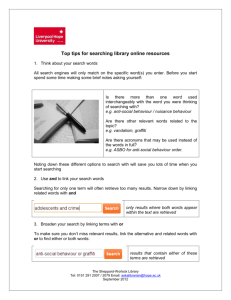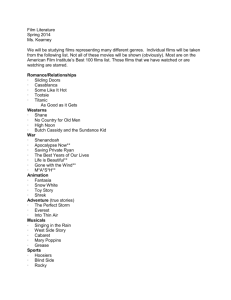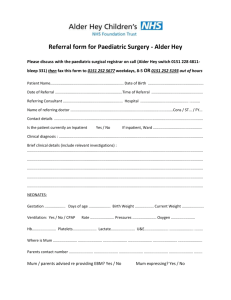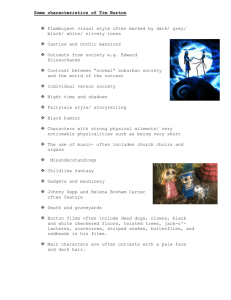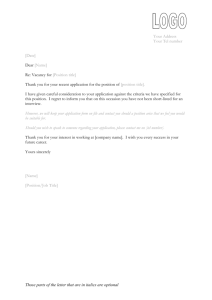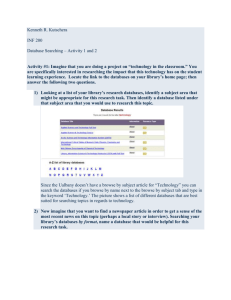Doing a literature search: a step by step guide
advertisement
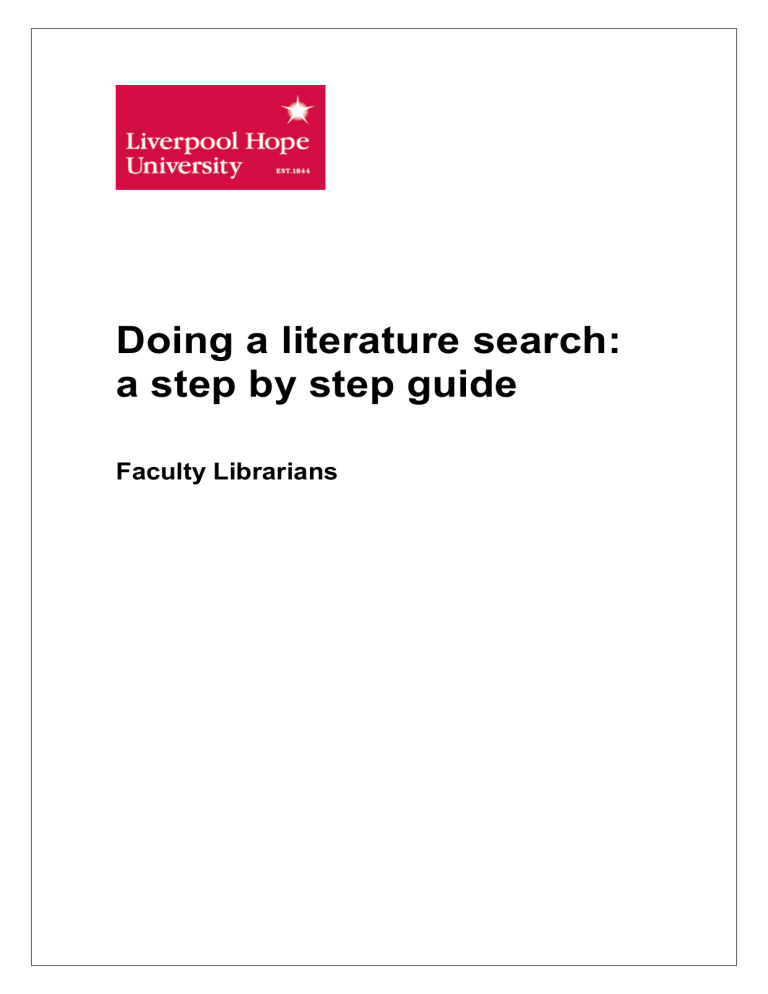
Doing a literature search: a step by step guide Faculty Librarians Table of Contents What is a literature search? ............................................................................. 3 Why carry out a literature search? ................................................................... 3 The Stages of the Literature Search ................................................................ 4 1. Background reading and preparation ..................................................... 4 2. Working with your title: identify search terms ......................................... 5 3. Identify the resources to search ............................................................. 8 Different types of databases ........................................................... 9 4. Search using search techniques .......................................................... 10 a) Word endings ................................................................................ 10 b) Linking terms together ................................................................... 11 c) Variant spellings ............................................................................ 12 d) Finding phrases ............................................................................. 12 e) Currency ........................................................................................ 13 f) Think about where the database is looking for your search terms . 14 g) Searching with more than one search box .................................... 16 5. Collating your results............................................................................ 18 Glossary of terms ........................................................................................... 19 The Sheppard-Worlock Library Tel: 0151 291 2007 / 2079 Email: askalibrarian@hope.ac.uk September 2012 2 What is a literature search? A literature search is a systematic and thorough search of all types of published literature in order to identify a breadth of good quality references relevant to a specific topic. The success of your research project is dependent on a thorough review of the academic literature at the outset. It is therefore a fundamental element of the methodology of any research project. Effective literature searching is a critical skill in its own right and will prove valuable for any future information gathering activity whether in academia or not. Getting the literature search right will save hours of time through the course of your research project and will inform and improve the quality of the research you go on to do for yourself. In practice, in addition to academic texts, journals are the main source of information for most in-depth literature searches related to an extended essay, dissertation or research project. However, depending on your topic many other sources will prove equally valuable such as newspaper archives, images, primary data and conference proceedings. Why carry out a literature search? There are several aims of this kind of search: Review existing critical opinions/theories Identify current research findings on a topic Identify potential research methods or models you could use Having carried out research, enabling comparison with your own research findings The literature search can be a time-consuming job – you need to be well prepared before beginning. The Sheppard-Worlock Library Tel: 0151 291 2007 / 2079 Email: askalibrarian@hope.ac.uk September 2012 3 The Stages of the Literature Search A good literature search involves the following steps which should be worked through systematically: 1. Background reading and preparation 2. Working with your title: identify search terms 3. Identify the resources to search 4. Search using search techniques 5. Collate your results 1. Background reading and preparation Start by doing some background reading of textbooks, subject encyclopaedias, etc., to get a grasp of the context of the topic and the terminology used in its discussion. What is the starting point that has led you to choose this topic for your extended research project? Is there a seminal book or journal article on the topic you have read? Is the subject currently being discussed in the media? Do you have personal knowledge / experience of the topic? Start off by identifying a small amount of reading material informed by the above to give you an overview of the topic. If there is a seminal book or journal article related to the topic, this in itself may contain good suggestions for further reading. The Sheppard-Worlock Library Tel: 0151 291 2007 / 2079 Email: askalibrarian@hope.ac.uk September 2012 4 2. Working with your title: identify search terms In order to successfully carry out your search it is important to identify at the outset as much of the key terminology associated with the topic as possible. This will include a range of different terms. For example: Important authors Theories / concepts Key research reports or legislation Major genres / movements The simplest starting point for identifying such terms is to spend some time thinking about the wording you are considering for the draft title of your research. Within any title, it will be possible to identify several key elements. Let’s say I am doing a research project into the representation of women in 20th Century American crime films. I decide my draft working title will be: The changing image of women in 20th Century American crime films. This title therefore has the following key elements: Crime films (our main topic of enquiry) Portrayal of women (the particular angle of our research) America (our locational focus) 20th Century (our time period of interest) The Sheppard-Worlock Library Tel: 0151 291 2007 / 2079 Email: askalibrarian@hope.ac.uk September 2012 5 Whatever your topic you will be able to think about your title in a similar way. For each of the key elements within your title we can think about: alternative terms (synonyms) – words used interchangeably to mean the same thing e.g. a synonym of children is kids related terms / concepts e.g. related words such as girls, boys, teenagers We’ll take each key element of the draft title in turn: Crime films Alternative terms: Crime drama Crime melodrama Crime movies Film noir Detective movies Related terms: e.g. particular character types you will find in such films: Femme fatale Private eye Private detective Villains Serial killers Gangsters Women Alternative terms: Woman Females Girls Ladies The Sheppard-Worlock Library Tel: 0151 291 2007 / 2079 Email: askalibrarian@hope.ac.uk September 2012 6 Related terms: Gender Molls Femme fatale America Alternative terms: United States United States of America US USA Related terms: Hollywood Studio names e.g. MGM, Universal Specific directors e.g. Alfred Hitchcock, Quentin Tarantino 20th Century Alternative terms: Twentieth century Related terms: Specific time periods e.g. 1940s, 1950s Remember, no search engine, whether in a database of journals or an Internet search engine, is intuitive. They are merely computer programmes designed to match on the exact words you enter. Unless you think about the range of potential search terms you are certain to miss content that is relevant to your topic. The Sheppard-Worlock Library Tel: 0151 291 2007 / 2079 Email: askalibrarian@hope.ac.uk September 2012 7 3. Identify the resources to search Unfortunately, regardless of the subject you are studying, there is no one single source of information that will contain everything you need for your literature search. Liverpool Hope University has access to over 100 different online resources covering the research needs of all the different academic subjects. In practice, however, you will only need to search a relatively small number of resources, but you will need to give some thought as to which resources are likely to contain the most relevant content to the topic you are researching. A starting point for your search will be to use the search facility in Online Library. This will do a broad search of all the journal literature we have online access to. This will be useful to identify some initial references. However, just searching Online Library will not do an exhaustive and comprehensive search of the literature. You will therefore need to go directly into a small number of individual resources and search them in their own right. You can do this by selecting the Find a resource option in Online Library. Whilst there are some databases that contain exclusively full text articles, most contain a mixture of full text and abstract only content. Databases however allow you to restrict your search to only retrieve full text results if you choose to. Note – Online Library will allow you to search across all databases to find the full text of an article if the abstract only is available in the database you are searching. Choose the Online Library option Article Linker. The Sheppard-Worlock Library Tel: 0151 291 2007 / 2079 Email: askalibrarian@hope.ac.uk September 2012 8 Different types of databases Multi-disciplinary journal databases Resources such as Academic Search Complete, Academic OneFile and JSTOR contain journal content across a large range of academic subjects. Often multi-disciplinary databases will contain professional and trade journals as well as academic peer-reviewed journals. You will however usually be able to restrict your search to just find academic peer-reviewed journals. Subject specific databases Contain journal articles and/or other types of content relevant to a specific subject or group of related subjects. Examples include PsycArticles, Education Research Complete, Westlaw and International Index to Performing Arts. Publishers’ databases Databases such as Science Direct, Sage Journals and Emerald contain journal content published by a particular publishing company. Such resources may also have a subject focus or may be multi-disciplinary. Other types of content Remember Online Library allows access to a large number of databases containing other relevant non-journal content that may contribute to your literature search such as E-books, newspapers, images, audio & video, legal and Government information and Encyclopaedias. The Sheppard-Worlock Library Tel: 0151 291 2007 / 2079 Email: askalibrarian@hope.ac.uk September 2012 9 4. Search using search techniques Having identified the potential terminology to search with, and which databases to search, the quality of your results will be improved by employing some of the techniques outlined below. As a general rule avoid using the ‘simple’ or ‘basic’ search option (where you only get one box to type your words in). Always use the advanced search (or multi-search box search). This is because it is only in the advanced search that you will be able to use all the techniques that follow. a) Word endings Search engines also won’t automatically search for derivatives of the same word. For example: Searching for the word cinema won’t necessarily find cinematics. This may even affect simple variants such as the singular and plural of the same word such as cinema and cinemas. Often with databases of journal articles if you insert an asterisk * at the end of the ‘stem’ of the word it will automatically search for all the endings for that word stem. The Sheppard-Worlock Library Tel: 0151 291 2007 / 2079 Email: askalibrarian@hope.ac.uk September 2012 10 For example: cinema* Will find: Cinema Cinemas Cinematic Cinematics If you aren’t sure where to insert the asterisk * always include it where the word ending changes. b) Linking terms together If you want to enter more than one term into a search engine you should link the terms with either the connecting word and or the connecting word or. Linking two terms with and will narrow your search to find only results that contain both terms. Linking two terms with or will broaden your search to find any results that contain either or both terms. For example: films and movies The Sheppard-Worlock Library Tel: 0151 291 2007 / 2079 Email: askalibrarian@hope.ac.uk September 2012 11 The above example will find only the results that contain both the term films and the term movies. It won’t find any results that just refer to films on their own or just refer to movies without any mention of films. films or movies The above example will find any results that just mention films, any results that just mention movies AND any results that mention both films and movies. c) Variant spellings Databases will only match on the specific word you enter. In practice this means they aren’t capable of coping with variant spellings such as American / English variants e.g. searching for colour won’t necessarily find any results containing the American spelling color. Use or between the two different spellings to find either. Note – watch your spelling! Databases are notoriously unforgiving of misspelt words. A common reason for not finding the results you would expect is due to misspelt terms. d) Finding phrases If your search terms are expressed as a phrase i.e. more than one word appearing immediately next to another, insert your search terms in quotation marks “….” e.g. “crime films” “United States” “film noir” The Sheppard-Worlock Library Tel: 0151 291 2007 / 2079 Email: askalibrarian@hope.ac.uk September 2012 12 This ensures that our words always appear immediately next to each other in the text of the results: “crime films” In the above example then the word crime will always appear next to the word films in the text of the results. Note - in searching speak we do not mean the normal definition of a phrase i.e. “a common saying or expression” merely words that always appear next to each other. What happens if you don’t do this? crime films If you don’t insert phrases in quotation marks as in the example above, the database will usually find results that find both words but there may not be any contextual relevance between the words. Put simply, the word crime may appear in one paragraph, the word films may appear in another. e) Currency Think about whether currency of the references you find is a factor as to whether they are relevant to your topic. Is up to date material critical or are older references just as valid? This will very much depend on your individual topic and area of study. Nearly all databases of journal articles will allow you to limit your results to only articles published within a certain range of years. This can be a powerful way of limiting the results you find and ensuring that you don’t get overwhelmed with too many references. The Sheppard-Worlock Library Tel: 0151 291 2007 / 2079 Email: askalibrarian@hope.ac.uk September 2012 13 For example, you might decide that research published in the last decade is of particular relevance as there have been a number of key developments during this time period: f) Think about where the database is looking for your search terms Most databases allow you to choose where in the article / publication your search terms can appear: Searching for your search term(s) in the title is a good starting point as if your term(s) appears in the title, the publication will have a high degree of relevance to that topic: films and movies In the above example both the term films and the term movies will appear in the title of results. The Sheppard-Worlock Library Tel: 0151 291 2007 / 2079 Email: askalibrarian@hope.ac.uk September 2012 14 If this doesn’t find enough relevant material try searching in the abstract / subject / keywords. Abstracts are written in such a way that key terms describing the content of the article are always included. Therefore if your search terms appear in the abstract, the publication will have a high degree of relevancy to them. crim* and film* In the above example both derivatives of the word crime (such as crime, crimes, criminal, criminality) and derivatives of the word film (film, films, filming) will both appear in the abstract of results. Keywords / subject terms are assigned either by the author or the database producer to describe the main topics discussed in the publication. Again, if your search terms appear as keywords or subject terms the publication will have a higher degree of relevancy to your topic. film* or movies In the above example either derivatives of film (film, films, filming) or movies will be found as subject terms that have been linked to the publications found. If you don’t choose where the database is searching they will usually search all fields in the publications searched. This will usually mean that the search terms you have searched with will appear anywhere within the full text of the publications found. They may therefore only have cursory relevance to your topic. The Sheppard-Worlock Library Tel: 0151 291 2007 / 2079 Email: askalibrarian@hope.ac.uk September 2012 15 g) Searching with more than one search box Often databases will allow you to put together a more structured search by searching for different sets of terms in different search boxes. You may have to choose an advanced search option to do this. Don’t be put off however as it is still straightforward to do and will mean that you find more relevant results for your topic. films or movies women or gender In the above example either the word films or the word movies will appear in the title of results. In addition to these terms appearing in the title, either the word women or the word gender will also appear in the abstract of results. This is because our two search lines have been linked with the AND circled in the picture above. To help you think about planning a search strategy for your own draft title, have a go at filling in the grid on the following page: The Sheppard-Worlock Library Tel: 0151 291 2007 / 2079 Email: askalibrarian@hope.ac.uk September 2012 16 The Sheppard-Worlock Library Tel: 0151 291 2007 / 2079 Email: askalibrarian@hope.ac.uk September 2012 17 5. Collating your results Analyse the material you find and group it in some order of priority. Filter out any peripheral materials and consider storing them separately from your core references. If any of your core journals references are unavailable in full text form from the database you have searched, remember you can use Online Library to see if the full text of the article is available from any other database by using Article Linker. If journals articles or books you need are not available locally or from online databases consider ordering them via the library’s interlibrary loans service. Information can be found at http://www.hope.ac.uk/gateway/library/ Note – it is essential that at every stage you keep accurate records of all searches and sources, and all references found and used! This will not only help you keep control of your research, but it will be vital when it comes to writing up your final bibliography and citations. And back-up your computer files regularly– every time you update them. If you need more help with your literature search contact either your Faculty Librarian (contact details available on the library website) or email askalibrarian@hope.ac.uk. Remember you can book a one-to-one tutorial with your Faculty Librarian at any point in your studies for help with your literature searching. The Sheppard-Worlock Library Tel: 0151 291 2007 / 2079 Email: askalibrarian@hope.ac.uk September 2012 18 Glossary of terms Below are explanations of some of the terms you will come across when literature searching: Abstract An authoritative summary of a journal article always included before the main text. In the case of qualitative, quantitative or scientific research will usually contain results in brief as part of the abstract. Article linker The Online Library option that allows you to search for a specific journal article. Note you will need the reference details for the article to use this option successfully. Citation Citation is another word for reference. In journal articles, the journal citation refers to the details of the issue of the journal the article was published in e.g. journal title, year of publication, volume and issue number, page numbers of the article. Database An online collection of information such as journal articles, e-books, newspapers etc. Fields Databases will allow you to search in different areas of text in a publication. The ‘fields’ therefore are areas of text such as title, abstract, author, full text. Searching in ‘all fields’ usually means searching anywhere in the text including the reference information. The Sheppard-Worlock Library Tel: 0151 291 2007 / 2079 Email: askalibrarian@hope.ac.uk September 2012 19 Find a resource Use this option in Online Library to access an individual database of your choice (as opposed to using the Online Library search). Full text You will be able to read the journal article in full (and usually download a PDF version of the full article). Journal volume / issue number When locating or referencing a journal article a key piece of information is the volume and issue number of the particular issue the article was published in. Volume usually refers to the year of publication i.e. a particular volume number is published in a particular calendar year (2012 = volume 1). Within a given volume of a journal numbered issues are produced throughout the year e.g. 2012 vol.1 no.1. Keywords / subject terms Keywords or subject terms are assigned either by the author or the database producer to describe the main topics discussed in the publication. Library catalogue A database of all the items held by a particular library. The bulk of the items listed in a library catalogue will be print books for borrowing. Periodicals Is another word for journal or magazine. The Sheppard-Worlock Library Tel: 0151 291 2007 / 2079 Email: askalibrarian@hope.ac.uk September 2012 20 Peer review In order to be considered academic or ‘scholarly’ journal articles should have gone through a process of peer review prior to publication. This means the content has been critiqued and reviewed by experts in the same field prior to publication. Peer reviewed journal articles are the ‘gold standard’ for publishing research and hence why they are so important to your literature search. Popular journals / magazines In addition to peer reviewed academic journals, there may also be popular magazines that although publish on ‘serious’ subjects are not peer-reviewed and can usually be bought in standard newsagents. Examples include The Economist, New Statesman, New Scientist, Times Literary Supplement, History Today and many more. Professional / trade magazines In addition to peer reviewed academic journals covering their subject, many areas will also have ‘serious’ magazines aimed at practitioners within a field. These do not contain peer reviewed research but may provide useful commentary and news. Examples include Community Care, Police Review, Times Education Supplement, The Stage. Subject favourites Having selected Find a resource in Online Library, you can access the databases most relevant to your academic subject by selecting the drop down option ‘category’ and choosing ‘subject favourites’. Subscribed / subscriptions Some databases offer the option to limit your results to ‘subscribed sources’ or ‘my subscriptions’. This is an alternative name for limiting your results to full text. If you choose such an option you should only retrieve full text articles. The Sheppard-Worlock Library Tel: 0151 291 2007 / 2079 Email: askalibrarian@hope.ac.uk September 2012 21
